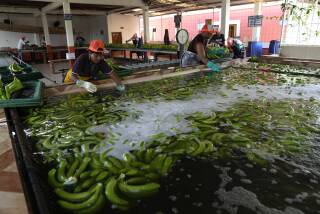Higher Quotas Would Ease Severe Economic Crisis, Nations Say : Caribbean Sugar Growers Plead for U.S. Help
- Share via
WASHINGTON — Ten Central American and Caribbean nations have formed a “sugar group” to try to crack the U.S. sugar market in what they say is a desperate effort to save their economic and social structures from crumbling despite millions of dollars in U.S. aid.
In a letter July 10 to Secretary of State George P. Shultz, ambassadors of the countries proposed a novel solution to the “severe crisis” they said has followed a crash in world sugar prices and the steady closing of the U.S. sugar market to imports.
The situation, they wrote, has had “a devastating impact” and “is beginning to affect the political and social stability of the region and will become untenable unless it is remedied promptly.”
The request, however, will force the Reagan Administration to choose between its desire to help Central America and its need to please powerful domestic corn and sugar interests, which strongly oppose further concessions. A decision is expected before Sept. 15, the deadline for announcing 1985-86 U.S. sugar-quota levels.
The wrangle over sugar is an example of the growing number of clashes between this nation’s domestic industries and its foreign policy goals, particularly in trade.
As impoverished foreign nations seek growth and income to repay debts by selling in the U.S. market, American businesses feel threatened by the less expensive foreign goods, and pressure grows for measures to protect jobs and income at home.
The Administration, seeking to combat a perceived spread of Soviet influence in Central America and the Caribbean, created the Caribbean Basin Initiative (CBI) in 1982 and the Jackson Plan last year as a step toward alleviating the poverty on which communism feeds.
The two programs and other foreign assistance have poured hundreds of millions of dollars in economic aid, trade arrangements and other concessions into the region.
Their Only Export
But the CBI benefits have been virtually negated by recipients’ huge losses in sugar, the region’s main cash crop, a major employer and--after 200 years of feeding the U.S. market--the only export of several small nations.
World sugar prices hit bottom in May at 2.5 cents a pound, making it cheaper to burn sugar cane than harvest it. The price reflects a glut of sugar subsidized by the European Economic Community in a market suddenly smaller because of U.S. import fees and quotas designed to protect U.S. corn and sugar growers.
Unable to do much about the European Economic Community, the CBI Sugar Group is pleading for broader access to U.S. consumers, now paying 21.75 cents a pound for raw sugar. So far, the CBI nations have had no luck.
In fact, the United States is moving steadily toward self-sufficiency in sweeteners, and quota levels are expected to be reduced this year.
U.S. imports from the CBI Sugar Group have declined from an average of 1.6 million tons a year between 1977 and 1981 to an estimated 594,000 tons this year. They were valued at $686 million in 1981, at $501.7 million in 1983 and at $250 million this year.
“The situation, instead of improving, is becoming worse, and the countries are not able to meet the payments of their foreign obligations . . . import goods and services at prior levels . . . (and) prevent the rise of unemployment levels,” Gilberto Goldstein, president of the Honduras Sugar Producer Assn., told a Georgetown University seminar on the problem last month.
“It would be totally disastrous that the area, which is of basic interest to the national security of the United States, should experience more political upheaval because of lack of vision at this time,” he said.
Honduras and the other nations of the CBI Sugar Group have hired the Washington law firm of former Reagan White House deputy chief of staff Michael K. Deaver to emphasize the point.
In addition to opposing further quota reductions, the CBI nations have proposed a new way into the U.S. market that would require no legislative action, avoiding confrontation with congressional defenders of the sugar growers in Louisiana, Florida, Hawaii and Texas. The State Department is backing the idea.
The mechanism would bring in an extra 1.5 million tons of Caribbean sugar, but only to be made into syrup--thus competing not with U.S sugar, but with sweeteners made from U.S. corn, called high fructose corn syrup.
Corn syrup at 12 cents to 15 cents a pound is cheaper than U.S. sugar, but well above the world price. It has gradually replaced sugar in many manufacturing uses, notably in soft drinks, to the chagrin of U.S. sugar producers.
Market Less Saturated
But the market for it appears to be more or less saturated, according to Agriculture Department analysts, so cane syrup imports would not hurt U.S. sugar growers further, the ambassadors argued.
Instead, they said, imported cane syrup would challenge about 20% of the corn syrup market, “representing less than 1% of total U.S. corn production.” Surely, they argued, corn growers have other options, but the Caribbean nations have nothing to sell but sugar, and nowhere to sell it but here.
They are trying, with U.S. help, to start other crops and industries, but island soils are thin and new factories require the expenditure of money that the governments do not have.
“In the Caribbean, you need hurricane-proof crops, and there are only two: sugar cane and arrowroot,” a starchy plant used like potatoes, said Richard Holwill, deputy assistant secretary of state for the Caribbean.
Shift to Marijuana
One other option, is marijuana, he said, noting that “the argument can be made that you can expect a shift from sugar to marijuana on these islands if you kill the cane market. . . . That’s just economic reality.”
U.S. growers are unmoved.
“We recognize the political and economic reality of their situation,” said Alan Tank, speaking for the National Corngrowers Assn. “We just say their problem should not be laid on the back of (U.S.) domestic corn growers and refiners, especially at a time when agriculture is going through a tremendous wrenching here.”
The association, faced with exploding surpluses and an expected record 1985 harvest of 8.8 billion bushels, is “strongly opposed” to the CBI proposal, Tank said, because it would have “a tremendous impact” on corn growers who have invested in refining technology.
More to Read
Sign up for Essential California
The most important California stories and recommendations in your inbox every morning.
You may occasionally receive promotional content from the Los Angeles Times.












